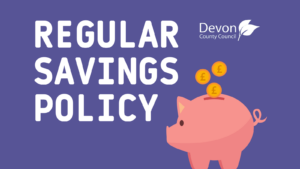
From April 2022, we introduced a brand new Regular Savings policy for young people in care aged under 18. Devon County Council will now be setting aside £5 per week for anyone who has been in our care for 12 months or more.
A printable version (PDF) of this guide is available here.
Our duty as corporate parents
Devon County Council is the corporate parent of all children and young people in our care, as well as those young adults who have recently left care. We, as corporate parent, have both a moral and legal duty to always pursue the best interests of our children and young people.
Our Corporate Parenting Strategy 2022-24 sets our ambition and commitment to see care-experienced children and young people to flourish and thrive in Devon.
Current context of long-term savings accounts for children and young people in care
All children and young people, in England, who have been in care for a continuous period of at least 12 months have either a Junior Individual Savings Account (ISA) or a Child Trust Fund in their name. These accounts are managed, on the direction of the Department for Education (DfE), by The Share Foundation, a registered charity in the UK. An opening balance of £200 for Junior ISAs, or £250 for most Child Trust Funds, is deposited by the DfE into all accounts.
More information on these accounts can be found on The Share Foundation website.
What’s new?
From 1 April 2022, Devon County Council is paying an additional £5 a week into the Junior ISAs and Child Trust Funds of children and young people in our care.
This does not include:
- children and young people with a permanence plan of adoption
- children and young people who are accommodated through a series of Short Breaks
- or children and young people who are living with parents under a Care Order.
Once deposited, this money belongs only to the child or young person as the named account holder; however, they won’t be able to access their account and make withdrawals until they claim the accounts and are aged 18 or over.
The money saved will be an important help during the young person’s first steps into adult life. We know early adulthood is an incredibly formative time for all young people, but especially so for those who grow up in care.
Is there anything that we need to do as carers and accommodation providers?
No, you don’t need to do anything to make sure the accounts are opened, and regular deposits made. We will take care of all of that with The Share Foundation. However, to help make sure young people are equipped and empowered to make the most of their savings, you can support them to prepare for independent adult life.
Preparing for adulthood and promoting independence
As the people who look after children and young people in care on a day-to-day basis, you play a key role in helping them to develop important life skills during their adolescence – skills that will set them up for early adulthood.
As your young people get older and approach leaving care age, you will be talking to them about their thoughts, feelings and plans for adult life. Part of this will be talking to them about their savings account; checking they know how they can get access to it, and generally helping them think through their options ready for when they access their money.
Formally, young people will discuss their plans for the future during pathway planning meetings. Young people are encouraged to speak to their Social Worker or Personal Advisor (be that during their pathway planning meetings or at any point) if they have any queries or concerns about their savings accounts. This includes finding what the current balance is and how they can get access to their account.
Importantly, once the young person turns 18 years of age and has claimed the account, the money is theirs. Only the young person is able to make withdrawals from the account. Ultimately, no carer or professional should determine how the money is used. In this context, young people must continue to access the support they are entitled to, and their level of savings must not affect that.
Making additional deposits
We know that many carers and accommodation providers already regularly set aside money for children and young people. However, we encourage all carers and providers to explore saving for their children and young people through accounts managed by the Share
Foundation to ensure the consistency and security of funds. Withdrawals from Junior ISAs or Child Trust Funds are only available for the child or young person when they really need it – for the vast majority, this will be when they turn 18 years old.
Importantly, savings made into these accounts are also not unduly affected by placement moves or leaving care, making sure that children and young people have a consistent long-term savings account in their name.
Visit the Share Foundation website to find out more about making additional deposits.
Additional information and guidance
The following pages on the Share Foundation website provide further advice and guidance: